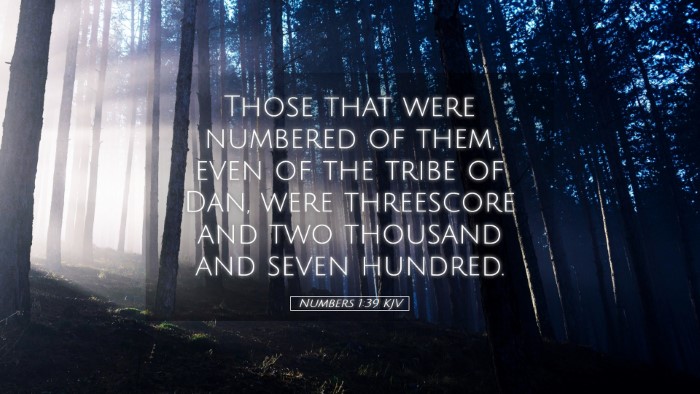Commentary on Numbers 1:39
Numbers 1:39 states: "Those that were numbered of them, even of the tribe of Benjamin, were thirty and five thousand and four hundred." This verse represents a crucial aspect of Israel's journey in the wilderness, focusing on the tribe of Benjamin within the larger context of the census conducted by Moses. Below is a compilation of insights from various public domain commentaries.
Overview
This verse is part of the broader account in Numbers 1 where God commands Moses to take a census of the Israelite tribes. Each tribe's size reflects both its military potential and its role in the communal life of Israel. The specific mention of Benjamin serves both numerical and symbolic purposes.
Contextual Significance
The tribe of Benjamin, despite its relatively small size compared to others, plays a significant role within the narrative of Israel.
- Historical Background: Benjamin was the youngest son of Jacob and was notably the tribe of King Saul. Their major cities included Jerusalem, adding to their strategic importance.
- Cultural Context: Benjamin's unique position as a small tribe does not diminish its significance; rather, it highlights the various roles played by different tribes in God's plan.
Theological Insights
The census in Numbers, particularly the reporting of Benjamin's numbers, carries deep theological implications.
- Divine Order: The enumeration of tribes points to God’s order and the importance of community in worship and warfare. God sustains His people as they rely on Him.
- Identity and Belonging: Each number represents individuals who have a place within God's covenant community. Benjamin's particular number illustrates the value God places on each tribe and its members.
- Future Prophecy: Benjamin's tribal representation foreshadows events in both the Old and New Testaments, particularly in connection with the formation of the early Christian church.
Commentary Insights from Matthew Henry
Matthew Henry highlights that the tribes were counted not just for military purposes but to also organize the nation in a way that reflects divine authority and leadership. He emphasizes that the relatively small number of the tribe of Benjamin speaks volumes about God's ability to use even the smallest among nations for His purposes.
Commentary Insights from Albert Barnes
Albert Barnes provides a detailed exegesis of the census as a means of establishing identity among the tribes of Israel. He points out that the exact number—thirty-five thousand and four hundred—does not merely denote a statistical figure but rather signifies God's active involvement in the life of Israel. The tribe of Benjamin, while less numerous, was still significant for its contributions to the nation, especially in the context of military service.
Commentary Insights from Adam Clarke
Adam Clarke emphasizes the potential spiritual lessons from this census. He notes that God carefully counts His people, showing that each person matters in the collective. Clarke also discusses the historical ramifications of Benjamin's numbered individuals, especially considering the later mention of this tribe in scripture where it becomes pivotal in various narratives involving kingship and leadership.
Conclusion
In Numbers 1:39, we find more than just a census number; we unearth the profound truth about God's sovereignty and intentionality in building His people. The insights drawn from the commentaries of Matthew Henry, Albert Barnes, and Adam Clarke remind us of the richness of Scripture and God's faithfulness to His covenant with Israel.
As pastors, students, theologians, and scholars delve into this text, they uncover not just historical data but divine principles that can inform faith, community, and identity in the present day.


